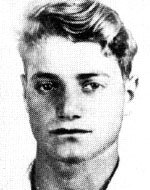Kempinski, Gabriel (Gabi)
Son of Sarah and Israel Eliyahu. He was born on August 24, 1919, in the town of Parshka, Poland. When he was three he moved with his parents and five brothers to Breslau, Germany. He received a traditional Jewish education and studied briefly in a yeshiva in the city of Frankfurt am Main. In 1935, he immigrated to Eretz Israel as part of the Youth Aliya and spent time in Kibbutz Rodges of the Hapoel Hamizrachi movement. Afterward, he became a trainee at the Karmner factory in Haifa Bay and later found work as a construction worker. At that time he lived with his brother in Kiryat Bialik and worked in Haifa. At night he served as a patrol and assisted Hagana workers in this area. Gabi was a sturdy and handsome lad, courteous and smiling. All his friends liked him very much. His parents, who immigrated to Israel after a while, had a devoted and caring son and tried his best to help them earn a living and acclimatize in Israel. From his youth he was an enthusiastic athlete and excelled in various sports such as soccer, swimming, table tennis and Jiu-jitsu. During his free time he played soccer and was a member of the football team of Hapoel Kfar Ata. At the same time, he tried to acquire as much education and knowledge as possible. In 1940 he accepted the call of Yishuv institutions and enlisted in the British army. He was posted to the Hebrew drivers’ unit of the Transportation Corps and sent to Egypt. Later in his service he rose to the rank of corporal. At the end of April 1943, an Allied convoy of ships left Alexandria, Egypt, via Malta to Sicily to participate in the invasion of Europe. One of the ships, the Aryanpura, also had members of Gabi’s unit. On the day of the 27th of Nisan 5703 (1.5.1943), at midday, a German reconnaissance plane circled over the ships, which immediately called the bomb planes. They arrived in the evening and bombarded the convoy of ships. In the bombing, the “Aryanpura” suffered two direct hits and a drowning. One hundred and forty of the soldiers, including Gabi, perished in the disaster. His name is mentioned in “The Soldier’s Book,” “The Book of the Volunteers,” and the book “Yizkor” published by the Jabotinsky Institute. In memory of those who perished in the monument at the military cemetery on Mount Herzl in Jerusalem, a ship-shaped monument was erected with the names of the fallen.
